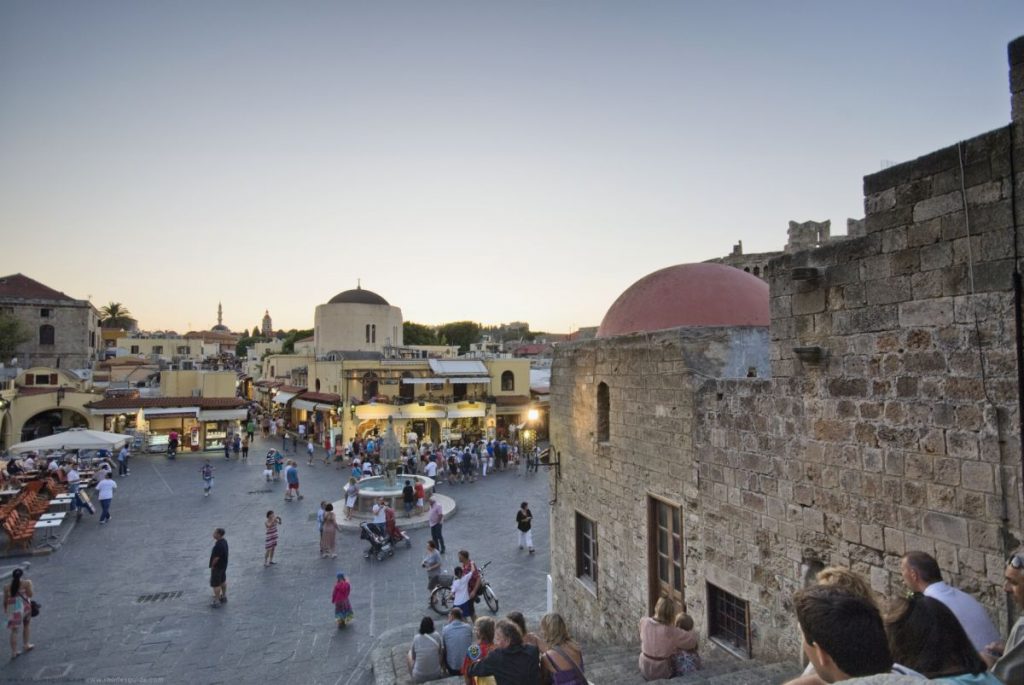Pindar and other ancient writers are very detailed in the description of Rhodes in their manuscripts. The origins of Rhodes are connected to a divine myth about Zeus (leader of the ancient Greek gods) and Helios (god of the Sun).
According to this myth, after Zeus’s victory against the Giants, he decided to divide the earth among the Olympian gods; The only god who received nothing was Helios.
He, according the myth, was absent and “No one remembered to include him in the draw”! When he came back he demanded his share, but Zeus told him that he was not able to make the cast again because the rest of the gods would not agree. Helios was disappointed but asked Zeus and the other gods to promise that the land that was to rise out of the sea could be his.
As he spoke, a beautiful island slowly emerged from the bottom of the blue sea, Rhodes. Helios bathed Rhodes with his own radiance and made it the most beautiful island in the Aegean Sea.
Rhodes was known in ancient times by several other names, such as Ophiousa (because a lot of snakes lived there), Asteria (for its clear blue and starry sky), Makaria (for its arresting beauty) and Atavyria (after its highest mountain, Atavyros).
Classical Period (408 BC – 226 BC)
Initially, those three cities maintained their administrative independence, but later united with three other Doric cities, Kos, Knidos and Halicarnassus, to form a federation of six cities, the so-called Doric Hexapolis.
In the 5th century BC, Rhodes suffered many changes as a result of warfare. For a short period it came under the influence of the Persians. When the Greeks defeated the Persians, Rhodes became a member of the Delian League under the leadership of Athens.
During the Peloponnesian War (431-404 BC), the Rhodians decided to found a new city by uniting the three largest cities on the island. They were very aware of the meaning of the motto “power in unity”. The new city was called Rhodes, after the island itself. Its foundation in 408 BC constitutes a landmark in the history of the island.
Hellenistic Period
The new city came under the influence of the two great Greek powers of that time, Athens and Sparta, until Macedonian intentions in that era became clear to all people of the ancient Greek world. The Rhodians lost no time in siding with the Macedonians. Later, during the siege of Tyre, they helped Alexander the Great to conquer it.
When Alexander’s empire fell to pieces, Rhodes developed close trade and political relations with the Ptolemeus Dynasty of Egypt. This was a ‘casus belli’ for Antigonus, the King of Syria, who in the summer of 305 BC sent his son, the famous Demetrius Poliorkitis (the ‘Besieger’) to capture the town of Rhodes.
The Rhodians, protected by their mighty walls, managed to resist capture for a whole year and forced Demetrius to raise his siege.
Demetrius’s failure to conquer the island marked the beginning of a new era for Rhodes, during which trade and marine activities reached their peak.
The Rhodians, in their effort to show correct maritime conduct, put into effect the so-called ‘International Marine Law of the Rhodians’, a code of law which is one of the most important early legal documents in the world.
Are you looking for Greek Lessons/ courses in Manchester or online with a professional teacher? Click here: Greek lessons to learn more about our Greek lessons. You can choose either face to face lessons – if you live in Manchester- or online courses


25 Comments. Leave new
… [Trackback]
[…] Find More on that Topic: mygreektutor.co.uk/rhodes-history/ […]
… [Trackback]
[…] Information to that Topic: mygreektutor.co.uk/rhodes-history/ […]
… [Trackback]
[…] Read More on to that Topic: mygreektutor.co.uk/rhodes-history/ […]
… [Trackback]
[…] Information to that Topic: mygreektutor.co.uk/rhodes-history/ […]
… [Trackback]
[…] Find More on on that Topic: mygreektutor.co.uk/rhodes-history/ […]
… [Trackback]
[…] Find More on on that Topic: mygreektutor.co.uk/rhodes-history/ […]
… [Trackback]
[…] Read More here to that Topic: mygreektutor.co.uk/rhodes-history/ […]
… [Trackback]
[…] Find More to that Topic: mygreektutor.co.uk/rhodes-history/ […]
… [Trackback]
[…] Find More Info here on that Topic: mygreektutor.co.uk/rhodes-history/ […]
… [Trackback]
[…] Information on that Topic: mygreektutor.co.uk/rhodes-history/ […]
… [Trackback]
[…] Find More Information here to that Topic: mygreektutor.co.uk/rhodes-history/ […]
… [Trackback]
[…] Information on that Topic: mygreektutor.co.uk/rhodes-history/ […]
… [Trackback]
[…] Read More on that Topic: mygreektutor.co.uk/rhodes-history/ […]
… [Trackback]
[…] There you can find 40912 more Info on that Topic: mygreektutor.co.uk/rhodes-history/ […]
… [Trackback]
[…] There you can find 15513 more Information to that Topic: mygreektutor.co.uk/rhodes-history/ […]
… [Trackback]
[…] Info to that Topic: mygreektutor.co.uk/rhodes-history/ […]
… [Trackback]
[…] Find More on that Topic: mygreektutor.co.uk/rhodes-history/ […]
… [Trackback]
[…] Info on that Topic: mygreektutor.co.uk/rhodes-history/ […]
… [Trackback]
[…] Read More Information here on that Topic: mygreektutor.co.uk/rhodes-history/ […]
… [Trackback]
[…] Find More to that Topic: mygreektutor.co.uk/rhodes-history/ […]
… [Trackback]
[…] Information to that Topic: mygreektutor.co.uk/rhodes-history/ […]
… [Trackback]
[…] Find More Info here to that Topic: mygreektutor.co.uk/rhodes-history/ […]
… [Trackback]
[…] Find More on to that Topic: mygreektutor.co.uk/rhodes-history/ […]
… [Trackback]
[…] Information to that Topic: mygreektutor.co.uk/rhodes-history/ […]
… [Trackback]
[…] Find More Information here to that Topic: mygreektutor.co.uk/rhodes-history/ […]